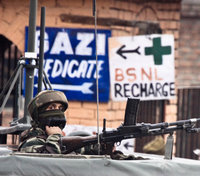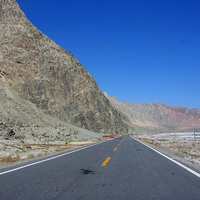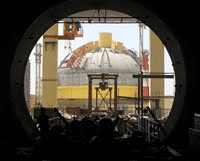Russia and India recently agreed to jointly manufacture a military transport plane. In an e-mail interview, Seema Desai, a London-based analyst in Eurasia Group’s Asia practice, discusses India-Russia defense relations. WPR: Historically, what kind of defense relationship have India and Russia shared? Seema Desai: India and Russia have traditionally shared a very strong defense relationship, with past purchases including fighter aircraft, missiles, submarines, and aircraft carriers, in addition to other equipment such as radars and tanks. Although India still buys the bulk of its military hardware from Russia (around 60 percent), Russia is a less-dominant player than it has been […]
India Archive
Free Newsletter

The idyllic valley of Kashmir has been gripped by violence for more than three months now. Unlike past unrest, however, this summer’s riots have seen a new generation of young Kashmiris venting their anger at a central government that has failed to capitalize on the stability of recent years to provide them with economic opportunities and political reconciliation. The state government led by the telegenic, much-hyped Omar Abdullah waited almost two months after the initial violence to begin outreach efforts, by which time more than 50 people had already died in street protests and police action. New Delhi, too, stayed […]
This proposed India-Oman deepwater natural gas pipeline represents a potential major shift in the connectivity networks linking Central Asia to South Asia. Once laid, pipelines help determine geopolitical realities for decades, as a glance at the legacy impact of Soviet-Russian pipelines on Central Asian politics reveals. If the Gulf serves as an effective workaround to bypass the Afghanistan-Pakistan transit route, it would dramatically reduce the strategic logic of stabilizing the Af-Pak region. The fact that Iran is involved in this deal as a source country is also a major plus, as it applies additional commercial constraints on Tehran to keep […]

Indian Defense Minister A.K. Anthony visited South Korea last week at the invitation of his South Korean counterpart to boost defense cooperation between the two states. His visit came just two months after the Indian external affairs minister visited Seoul and at a time of great turbulence in the strategic environment of the Asia-Pacific region. After having long ignored each other, India and South Korea are now beginning to recognize the importance of tighter ties. The resulting courtship was highlighted by South Korean President Lee Myung-Bak’s state visit to New Delhi in January, when he was the chief guest at […]

Strategic encirclement is a term that haunts Indian analysts quite a bit these days. So when noted Subcontinent watcher Selig S. Harrison reported in late August that 7,000-11,000 Chinese troops had poured into the northern part of Pakistani-administered Kashmir known as the Gilgit-Baltistan region, the feeling that India was being systematically “surrounded” by Beijing was loudly echoed in the Indian media. The revelations follow a recent controversy triggered by China’s refusal to issue a visa to an Indian general on the grounds that his area of responsibility falls in the disputed Kashmir region; Beijing will only issue “stapled visas” to […]
Addressing the possibility that the U.S. and Europe will shy away from military interventions post-Iraq/post-Afghanistan, Richard Gowan suggests that emerging countries — Brazil, China and India, in particular — could very well step in to fill the gap in the context of U.N. state-building operations. It tracks well with what Matt Armstrong wrote in his WPR feature article, U.N. Peacekeeping as Public Diplomacy. (Gowan’s article in that issue, The Tragedy of 21st Century U.N. Peacekeeping, makes for good reading, too, as a cautionary note.) In this case, emerging countries’ interest in burnishing their global bona fides would overlap with U.S. […]
In the midst of a post on Turkey-India relations, and how they are limited by each seeing the other through the prism of Cyprus and Pakistan respectively, Mehmet Ozkan makes a good point about Turkey’s lack of membership in any of the emerging power forums, like BRIC or IBSA. He argues that such an involvement would help India and Turkey develop institutional ties that they currently lack. But it occurred to me that it would also be a solid credential ratifying Turkey’s status as not just just a regional power, but as a global middle power. I’m surprised that hasn’t […]

NEW DELHI — Indian Prime Minister Manmohan Singh called the recent passage of the Civil Liability for Nuclear Damages bill the end of “the nuclear apartheid that the world had imposed on India.” The language was meant to appeal to a domestic audience; for most international observers, the law simply marks India’s return to the international nuclear market. But in its final form, the liability law has left few on either side of the debate entirely satisfied. The contentious legislation, introduced this April in parliament, was steered through by the Congress-led government with help from the largest opposition party, the […]
